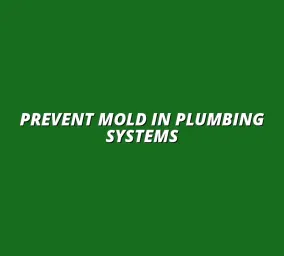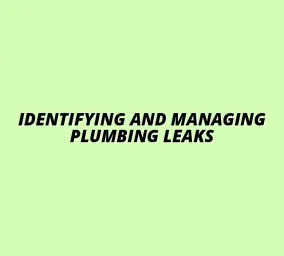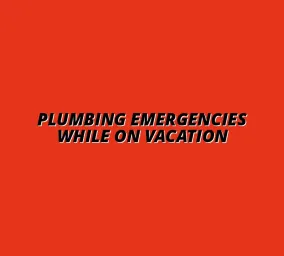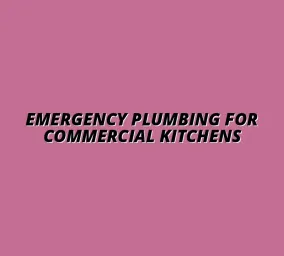Essential Plumbing Tips for Homeowners
Understanding the Importance of Preventative Plumbing for First-Time Homeowners
As a first-time homeowner, diving into the world of home maintenance can be overwhelming. One area that is crucial yet often overlooked is plumbing. Understanding the importance of preventative plumbing can save you from costly repairs and ensure your home remains a safe and comfortable space. Regular maintenance, as outlined in this helpful guide on maintaining your plumbing system easily, is key to long-term success.
Preventative plumbing maintenance not only helps you identify potential problems early on but also promotes the longevity of your plumbing system. A little attention now can lead to significant benefits in the long run, making your home a wiser investment.
Why First-Time Homeowners Should Prioritize Plumbing Maintenance
Many new homeowners may not realize how vital plumbing maintenance is. Regular checks can help avoid serious issues that could arise due to neglect. By prioritizing your plumbing, you ensure that everything functions smoothly, contributing to your overall home experience. Learning to prevent plumbing emergencies with maintenance is a valuable skill for any homeowner.
It's also essential to understand that the impact of plumbing issues stretches beyond just inconvenience; they can affect your home's market value. A well-maintained plumbing system can make your house more attractive to potential buyers in the future.
- Improved Home Value: A functioning plumbing system can raise your home’s appeal.
- Increased Comfort: Proper maintenance leads to fewer inconveniences.
- Peace of Mind: Regular maintenance helps you sleep well at night!
Impact of Plumbing Issues on Home Value
When showing your home to potential buyers, a well-maintained plumbing system can be a selling point. Major plumbing issues such as leaks or broken pipes can deter buyers and lead to price reductions. It's important to address minor plumbing problems before they escalate into serious issues. For example, a small leak left unattended can cause water damage, mold growth, and a host of other issues that may devalue your property. By being proactive, you’ll enhance your home’s appeal and maintain its value. Addressing a leaky faucet promptly, as described in this guide on how to fix a leaky faucet in steps, can save you money and headaches.
Long-Term Cost Savings Through Preventative Measures
Investing in preventative plumbing measures can significantly reduce long-term costs. Fixing small issues like leaks or clogs promptly can save you hundreds, if not thousands, in repair bills later on. In addition, regular inspections can help identify potential problems before they require major work. Preventing pipe corrosion, as detailed in this article on preventing pipe corrosion, is crucial for long-term system health.
Consider these cost-saving benefits:
- Early Detection: Catch issues before they escalate.
- Lower Repair Costs: Small fixes are cheaper than major repairs.
- Energy Efficiency: Well-maintained systems can reduce utility bills.
Common Plumbing Problems Faced by New Homeowners
As a new homeowner, you might encounter a few plumbing issues that are more common than you think. Being aware of these problems can help you address them swiftly and effectively. Here are some issues you may face:
Identifying these challenges early on will empower you to take appropriate action, ensuring your home remains comfortable and functional.
Leaky Faucets and Pipes
Leaky faucets and pipes are one of the most common plumbing issues. Not only are they annoying, but they can also lead to water wastage and increased utility bills. Even a small leak can result in significant water loss over time! It’s wise to fix these leaks as soon as you notice them. Learning how to stop a faucet leak quickly is a valuable skill for every homeowner. Regularly check your faucets and pipes for signs of wear and tear. You can often fix minor leaks yourself with some basic tools and plumbing knowledge.
Clogged Drains and Toilets
Clogs are another frequent plumbing problem. Over time, grease, hair, and debris can build up in your drains, causing slow drainage or complete blockages. Clogged toilets can be particularly inconvenient and often require immediate attention.
- Regular Cleaning: Use drain cleaners or natural remedies to keep drains clear.
- Watch What Goes Down: Avoid flushing items that can cause clogs.
- Use a Plunger: Keep one handy for emergencies!
Water Heater Issues
Water heater problems can be a headache, especially during colder months. If your water isn’t heating properly or there are leaks, it can disrupt your daily routine. Regular maintenance checks can help extend the life of your water heater and keep it running efficiently. Consider scheduling an annual water heater inspection to prevent costly repairs.
Take note of the age of your water heater and signs of wear. It’s often better to address these issues before they lead to more significant problems, like a complete breakdown.
Addressing Frequently Asked Questions About Preventative Plumbing
Many homeowners find themselves puzzled by the ins and outs of plumbing maintenance. It's common to have questions, especially if you're new to home ownership. Understanding these frequent inquiries can help you navigate the plumbing landscape with more confidence.
In this section, I'll tackle some of the most common misconceptions and concerns about plumbing maintenance. By clearing up these myths, you can make more informed decisions about your plumbing care.
Common Misconceptions About Plumbing Maintenance
One major misconception is that all plumbing issues require professional help. While some problems certainly do, others can be handled with a little know-how and the right tools. It's essential to know when to roll up your sleeves and when to call in the experts!
Another question that often arises is whether DIY plumbing maintenance is safe for everyone. While many homeowners can handle minor tasks, it's crucial to understand your limits. Assessing your skills can prevent potential disasters and costly mistakes.
- Consider your experience level with home repairs.
- Evaluate the complexity of the plumbing issue.
- Research safety guidelines for DIY tasks.
Do All Plumbing Issues Require Professional Help?
Not every plumbing problem needs a plumber! Some issues can be easily resolved by homeowners. Here's a quick guide to when you might need a professional:
- Severe leaks that cause water damage.
- Clogged drains that won’t budge after attempts to clear them.
- Signs of mold or mildew from hidden leaks.
Knowing the difference can save you time and money. If you're ever in doubt, it’s better to ask for help than to risk further damage! For assistance in Birmingham, consider contacting a plumber in Edgbaston, Birmingham.
Is DIY Plumbing Maintenance Safe for Everyone?
While many plumbing tasks can be performed safely by homeowners, it's essential to recognize your own limits. Here are some pointers to help you determine if a DIY approach is right for you:
- Educate yourself about the specific task.
- Gather the necessary tools and materials.
- Don't hesitate to watch tutorial videos for guidance.
Remember, safety always comes first! If you feel unsure at any point, it's wise to consult a professional.
When to Call a Professional Plumber
Recognizing when to call a professional plumber can save you from costly repairs and headaches. Certain signs indicate that it's time to seek expert assistance. Plus, knowing these signs can help you keep your home in tip-top shape!
Here are key indicators that you should reach out for professional help:
- Unusual noises coming from pipes or fixtures.
- Persistent odors of sewage or mold.
- Frequent clogs that need constant attention.
Signs That Indicate a Need for Expert Assistance
Some symptoms are clear indicators of more significant plumbing issues. Here’s a breakdown of alarming signs that should prompt you to contact a plumber:
- Excessive water bills that don't match your consumption.
- Water pooling in your yard or on your floors.
- Inconsistent water pressure throughout the house.
Addressing these problems early can help you avoid major repairs down the road!
How to Choose the Right Plumbing Professional
Choosing the right plumber is crucial for ensuring your home's plumbing issues are resolved effectively. When searching for a plumbing professional, keep the following tips in mind:
- Check for licenses and insurance.
- Read reviews and ask for recommendations.
- Request a detailed estimate before work begins.
Taking the time to select a qualified plumber can lead to a successful repair and peace of mind!
Summarizing Key Preventative Plumbing Strategies for Homeowners
Effective plumbing maintenance not only saves you money but also extends the life of your home’s plumbing system. By implementing a routine maintenance plan, you can identify and resolve issues before they escalate into costly repairs.
In this section, I’ll summarize the key strategies you can adopt to keep your plumbing in excellent condition. Simple habits can lead to significant long-term benefits for your home!
Creating a Plumbing Maintenance Schedule
Establishing a plumbing maintenance schedule is a great way to stay on top of repairs. Consistent check-ups can help you identify problems early on. Here’s how to get started:
- Choose a regular time each season to inspect your plumbing.
- Keep track of any repairs or maintenance performed.
- Incorporate reminders for tasks like changing filters.
Tools and Resources for Homeowners
Having the right tools and resources can make plumbing maintenance much easier. Here’s a quick list of essential items every homeowner should have:
- Pipe wrenches and pliers.
- Plumber's tape and sealant.
- Drain snake or auger for clogs.
With these tools in hand, you’ll be better equipped to tackle basic plumbing tasks!
Incorporating Plumbing Maintenance into Home Management Plans
To keep your plumbing in good shape, it's helpful to incorporate maintenance into your general home management plan. This approach can help ensure that plumbing care stays a priority:
- Integrate plumbing checks into your seasonal home maintenance checklist.
- Set aside a budget for plumbing repairs and upgrades.
- Educate family members about simple plumbing tasks.
By making plumbing care routine, you'll enjoy a more comfortable and efficient home!
Encouraging a Proactive Approach to Plumbing Care
Adopting a proactive approach to plumbing care can save both time and money. Teaching household members about plumbing basics can empower everyone to contribute to maintaining the home.
Here are some benefits of encouraging a proactive plumbing culture in your home:
- Improved awareness of plumbing issues among family members.
- Reduced risk of plumbing emergencies.
- Enhanced teamwork in home maintenance tasks.
Benefits of Educating Household Members on Plumbing Basics
Educating your family about plumbing basics can lead to many advantages. Here are a few:
- Faster identification of minor issues before they become big problems.
- Increased confidence in handling minor repairs.
- Stronger teamwork in home upkeep.
Teaching these skills can foster a more informed and capable household!
Long-Term Value of Preventative Plumbing Habits
Building good plumbing habits can lead to long-term savings and peace of mind. By practicing regular maintenance and encouraging everyone in the household to participate, you can maintain a healthy plumbing system.
Ultimately, having a proactive plumbing care plan can help you avoid major repairs and keep your home comfortable!






